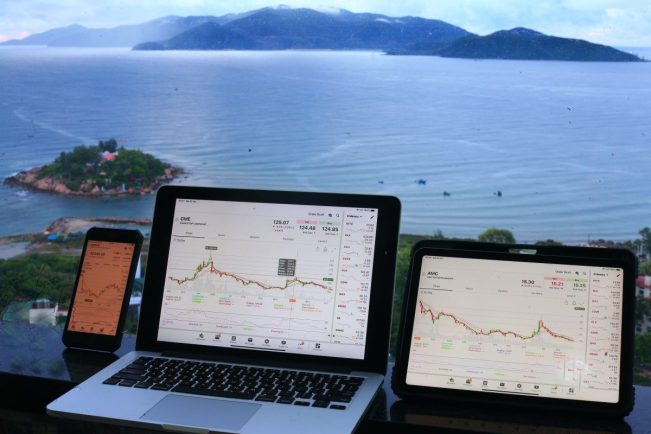YouTube and other social media platforms show vlogs of people who earn money while travelling the world and having new experiences. Some don’t travel but live a lifestyle of trading and funding their passions. Whatever you choose, FX trading presents an excellent opportunity for your lifestyle. A trader’s lifestyle is envied by many, but traders know that it is necessary to put in the work. If you admire the trader lifestyle and want to trade forex, this article is for you. You’ll learn how forex works, what trading means, and how forex trading will impact your daily routine.
What is Forex Trading?
All countries have a practical means of exchange, called currency. Due to economic value, the currencies of different countries have relative values. Both parties must agree to pay the equivalent of the currencies when used for international trade as they convert to others. The difference in value gives rise to trading opportunities, allowing currency traders to profit from selling or buying one currency for another or simply exchanging different currencies. Forex trading refers to the formal trading of currencies via authorised brokers at retail levels or by big financial institutions. Anyone can trade forex today by leveraging the internet, mobile devices and computers. Here are two important parties in forex trading:
- Forex Broker: A forex broker is a financial company that provides traders access to the forex market. Retail traders can only trade forex through licensed brokers. Most brokers have proprietary trading software available on mobile devices and computers.
- Forex market: The forex market is a decentralised, global, and regulated market that operates 24 hours a day, five days a week. But traders have access to the market 24/7 because overlapping forex sessions are located in different timezones.
How Does Forex Work?
In forex trading, the currencies are listed in pairs, so a trader automatically buys and sells either currency at a time. Traders must enter an amount of money, called the lot, to trade. In a currency pair, the first currency is the base, while the second is the quote. The price of a forex pair tells how much of the base currency is needed to buy the quote. The bid-ask spread is the difference between the price that the seller offers and that which the buyer offers. Forex prices move in pips (percentage in profit), defined as the smallest unit by which a currency price changes. Here’s what happens when you place a trade:
When you determine (from analysis) that the price will go higher or lower, you enter a buy or sell, respectively.
If the price moves according to your analysis, you make profits relative to the number of pips and your lot size.
You can set Stop Loss and Take Profit to exit the trade automatically when you are not there.
You can trade with a margin to increase your potential profits.
If, for example, you analyse the EUR/USD pair at 1.1003 and you predict an upward movement, you can enter a buy trade. If you enter a buy with 0.5 as the lot size and a 5:1 margin and the price moves upward by 5 pips, your profits will be more than another trader that enters the same trade with a smaller lot and margin.
How to Trade Forex
If you are going to trade forex, you must get it right. Here is how you can begin:
Learn Forex Trading
Forex trading may look complex or simple depending on your background, but everyone looking to trade forex must get forex training. Forex education covers beginner topics such as how money works and the history of forex trading, and advanced topics, such as entering and exiting trades and then market analysis.
Register With a Broker
Find a forex broker that offers competitive trading conditions such as tight spreads, low transactions, and non-swap accounts. It would help to choose the right broker for trading forex because your broker largely determines your trading access. Other features are connection and execution speed, customer service, and cashier functions.
Practice
You may find it difficult to trade, for all your head knowledge about forex, if you don’t practice. Practising your forex strategies will help you build confidence and the right trading skills for live trading. Most brokers offer demo accounts for traders to practice with unlimited virtual funds.
Fund Your Account
When ready, fund your trading account with any amount you are comfortable with. Most brokers allow a minimum and maximum amount per deposit. Depositing into your trading account signifies your readiness to start the trading lifestyle, as no matter how long you practice, you will only make profits when you trade live accounts.
Analyse the Market and Trade
Market analysis is crucial to your trading performance. Forex is a data-based activity; you must make all trading decisions based on market data analysis to predict price movement. There are two types of market analysis; technical and fundamental analysis. Most traders use either, but it is best to combine both.
Portfolio Management
Portfolio management is another crucial step in forex trading. Focus on growing your trading capital safely, protect your portfolio and only take potentially profitable trades.
What Do Successful Traders Do?
The lifestyle of a trader is flexible, thanks to modern technologies. You can trade from any country which permits retail forex trading. You only need your mobile device or computer and a stable internet. You don’t have to be active in the market as a trader. As pro traders say, the market is always there. That means you have all the time to trade and rest. But successful traders maximise their trading lifestyle. Here’s what they do.
When Trading
When trading, profitable traders keep their emotions in check and only trade what they see on the charts. They also keep track of trades, using SL and TP or market trading orders to enter or exit trades. Most profitable traders also record trading results to analyse their trading performance.
When Not Trading
When they are not trading, successful traders rest and engage in other activities that they are passionate about. They also keep an eye on the market, watching for fundamental news that may present trading opportunities. Profitable traders also stay in good mental shape and learn trading psychology to make logical trading decisions.









